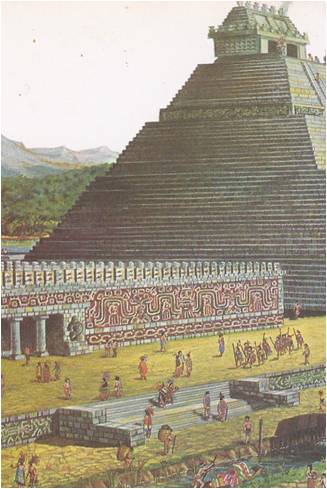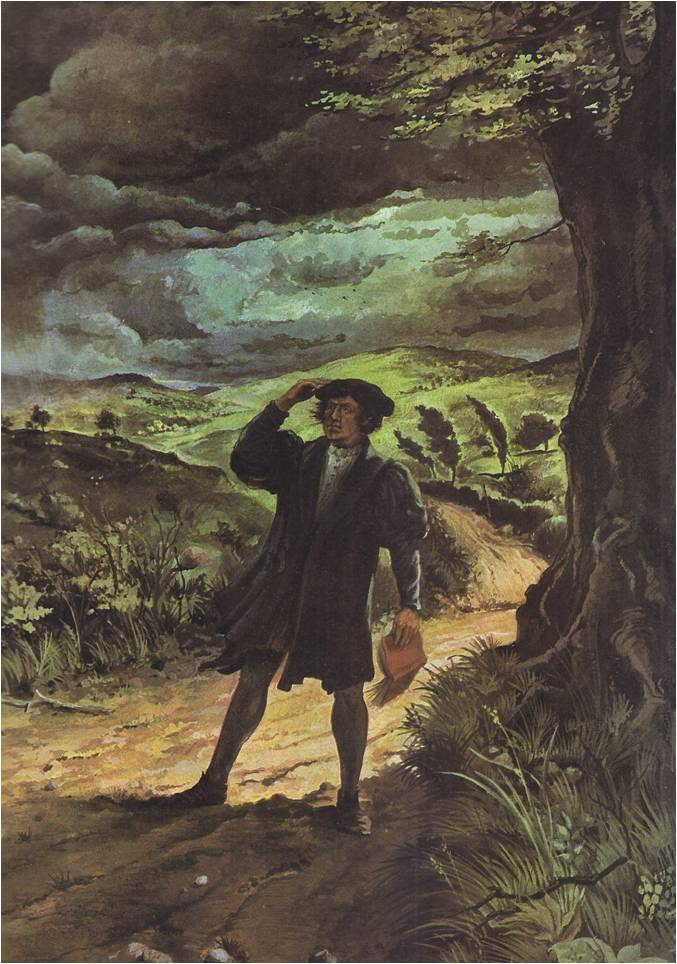“I DID NOT come to till the soil like a peasant,” said Hernando Cortez. “I came to find gold.” His words echoed the thoughts of almost every Spaniard in the New World. The discovery of the sea route to the West had set off a great treasure hunt. Colonizing and slaughtering, building and plundering, the gold-hungry Spaniards won a Spanish Empire of the West. Conquistadores‚ they were called — the conquerors. None of the treasure-hunters was more cunning or ambitious than Hernando Cortez‚ who came to the island of Hispaniola in 1504. It was not until 1519 that the governor …
Read More »Reformation and Exploration 1415 – 1634
A New World and a New Sea 1492-1522
ALONG THE DUSTY SPANISH road leading north from Granada plodded a mule. On its back, bouncing and cursing his luck, sat a glum Italian sea captain. Four years before, Captain Cristobal Colon — the English would call him Christopher Columbus — had come to Spain on horseback, like a gentleman. He had been received at court, granted audiences with King Ferdinand and Queen Isabella and invited to describe his daring plan to sail west across the Ocean Sea to India. Royal advisers had asked to study his maps and the charts on which he had plotted a course and he …
Read More »Prince Henry’s School 1415 – 1499
IN 1415, WHEN ALL OF CHRISTENDOM belonged to one church and Christians battled pagan Turks instead of one another, a force of Portuguese marines set sail for the coast of Africa. They planned to attack a town called Ceuta. A stronghold that guarded the narrow passage connecting the Mediterranean Sea with the Atlantic, Ceuta was the end link in the chain of fortresses and well-armed ports that the Turks had tightened around the southern and eastern boundaries of Europe. Held in by this chain, European merchants could not trade in the luxury-filled markets of the east, pilgrims could not journey …
Read More »Defender of the Faith 1521 – 1603
OF ALL THE RULERS OF EUROPE, none was more eager to please the pope, more anxious to prove himself a loyal son of the Church, than Henry VIII, the handsome young monarch of England. Henry was one of the first to offer his soldiers when the pope formed a Holy League to fight the Turks (and to frighten off the French kings, who had developed the unfortunate habit of invading Italy every few years). Henry never actually sent the troops. To show that he meant well, he wrote a strongly worded book about the duties that men owed the pope …
Read More »The Counter Reformation 1521-1648
THE BLAST OF MUSKETS and the clang of swords against armour echoed across the plains of Italy, Spain and the Lowlands. Warriors of the king of France were clashing with the Spanish infantry and German knights of the Holy Roman Emperor. Control of the nations of Europe was the prize both nations sought. They schemed and plotted; their generals planned campaigns; their soldiers marched out to victory or defeat. Victories counted for little, for much of Europe’s future was decided by another, different kind of war – a war for the minds and souls of men. Village squares and royal …
Read More »Preachers of Reform 1518-1564
IN 1518, AN INDULGENCE PEDDLER, a priest from France, made his way through one of the twisting Alpine passes that led into Switzerland. He carried with him a supply of bright banners, an impressive-looking copy of Pope Leo’s Declaration of Indulgences and of course, a collecting box. The French priest’s hopes were high, for the little Swiss merchant towns were rich. He did indeed do well at first and his collecting box began to grow heavy with pieces of gold. Then he came to the town of Zurich. As he began to set up his banners, a town official stopped …
Read More »The Monk from Wittenberg 1505-1546
ON A SULTRY JULY DAY IN 1505, a young law student, Martin Luther, was walking along a country road in Germany when a summer storm blew up. The air grew heavy and black clouds filled the sky. Before Luther could take shelter, thunder began to crash. A bolt of lightning struck the road almost at his feet. Thrown to the ground, he lay shaking, not certain whether he was alive or dead. “Help me, Saint Anne,” he cried, “help me and I will become a monk.” After a moment, Luther’s trembling stopped. He stood up, found that he was not …
Read More »The Walls Come Tumbling Down 1300-1415
IN THE MIDDLE AGES, when knights fought wars in Europe’s fields, robbers roamed the roads and the dark forests seemed filled with unknown dangers, men put their trust in walls. Around each little town rose ramparts of massive stonework, a strong defense against the evils outside. Within the safety of the wall was a crowded little world, complete in itself — a castle‚ a church, a monastery or two, a marketplace and a tangle of cobbled streets lined with the thatch-roofed houses of townsmen. In such a town a man knew his place. He was a nobleman or a knight, …
Read More »






